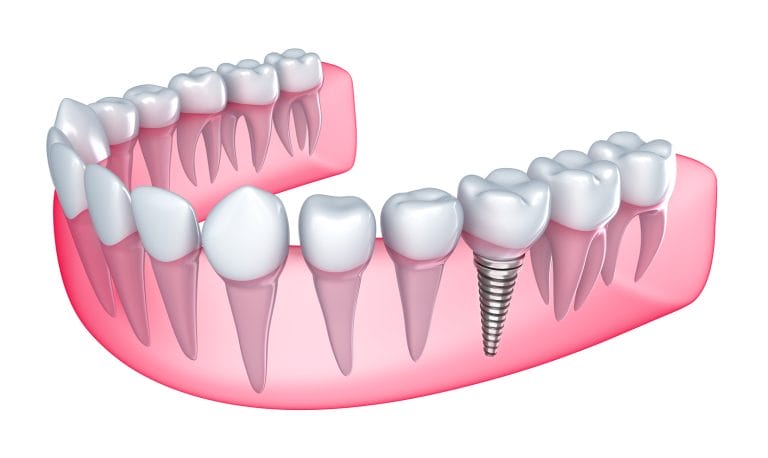Dental implants are medical frames surgically inserted into the jawbone to support replacement teeth. Typically, the dental implant system constitutes an anchor, the primary implant body, and an abutment supporting prosthetic teeth. The two sections connect using an abutment fixation screw. There are four types of dental implants: single-stage, two-stage, subperiosteal, and endosteal implants. These medical devices are convenient for individuals with missing teeth due to accidents, jawbone loss, and health complications such as periodontal disease. Many folks prefer dental implants to other tooth replacement options because they feel natural and remain stable, preventing artificial teeth from slipping back and forth. More so, there is no need to adjust the surrounding teeth when inserting dental implants. The latest study reveals that with a 97% success rate, over 3 million dental implant insertions occur annually in the United States.
Factors Affect Recovery After Dental Implant Surgery
Smoking
Smoking is one of the primary factors that affect the success rate of dental implants. Health experts say smoking interferes with the body’s natural healing process. Keep in mind that inserting implants involves a surgical procedure. For that reason, smoking increases the risk of developing infections. What’s more, you are likely to experience excessive bleeding during and after the procedure since nicotine causes vasoconstriction.
Hygiene
Dental surgeons insist on maintaining good hygiene after the surgery. Poor dental hygiene causes multiple infections, thus compromising the healing process. There is a need to practice good oral hygiene to keep bacteria at bay. Experts recommend brushing at least twice daily and flossing to prevent plaque buildup. One ought to care for prosthetics as they do for natural teeth.
Bone Mass
The majority of people with missing teeth experience jaw bone loss. Dental implants require enough bone mass for proper osseointegration—the lesser the bone mass, the slower the healing time. Dentists often recommend bone grafting several months before the surgery for individuals with inadequate bone mass.
Diet
Similar to most dental procedures, implant post-care requires one to be picky with diet. Spicy, crunchy, and acidic foods interfere with the healing period. The spicy and sour food increases sensitivity, thus causing too much discomfort. On the other hand, crunchy and hard foods exert a lot of pressure on the implants. This increases the chances of slipping back and forth. During the first few weeks, it is advisable to have soft meals such as mashed potatoes, chicken, fish, eggs, bananas, and well-cooked vegetables, to mention a few.
Dental Expert Skills
It is prudent to conduct background research before settling for a dental surgeon. A certified expert performs a less invasive procedure using the proper equipment. A less skillful dentist will compromise the integrity of your implants. Besides that, you may develop multiple infections that affect your general health.
At 3V Dental Associates, we have the expertise to ensure a successful dental implant surgery.
Caring for Your Implants While Recovering
Maintain Proper Oral Hygiene
As has been noted, good oral hygiene prevents plaque buildup. The standard recommendation is brushing teeth at least twice a day and flossing. However, avoid touching the surgical area for the first few days, as it is still too sensitive. The aggressiveness results in a wound, increasing the chances of developing infections. When the tenderness and sensitivity reduce, you can gradually begin to cleanse the area with gentleness. In conjunction with that, avoid sticky foods, which can be problematic during cleansing.
Use Saltwater Rinse
Saltwater is a natural disinfectant. After the surgery, use warm salt water three to four times daily. Avoid Listerine for the first few days as it increases sensitivity. Your dentist may recommend the best mouthwash to use at the time. Also, be cautious when swishing mouthwash: the vigorousness will irritate the surgical area.
Is Pain Normal After a Dental Implant Surgery?
The surgical procedure itself is pain-free due to dental sedation and the application of numbing agents. Nevertheless, expect to feel some minor pain and discomfort after the surgery. Acknowledge that this procedure involves creating an opening in the gums; therefore, you will notice bruising, and inflammation after the numbing agents wear off. The peak of pain and discomfort lasts for three to five days, after which it begins to subside. If you feel too much pain after two weeks, consult your surgeon, as this may be an alarm that something is wrong.
What Foods Should I Avoid After Dental Implant Surgery?
• Hard foods: carrots, ice, nuts, seeds, candy, corn on cobs, popcorn.
• Crunchy foods: chips, apples, breadsticks, pears, cereal, crackers, cucumbers.
• Sticky foods: caramels, gum.
• Acidic foods: pineapples, lemons, limes, grapes, oranges.
• Spicy foods
• Carbonated drinks
• Coffee
How Long Until I Fully Recover from Implant Surgery?
The standard healing time after surgery is six to eight months. However, the recovery period may vary for individuals depending on the cause of receiving dental implants.
Factors that Influence Implant Surgery Recovery Time.
• Medication
Post-Dental Implant Surgery Care
1. Use anti-inflammatory medication such as ibuprofen to counter swelling.
2. Take narcotic medication to alleviate pain.
3. Cleanse your mouth after each meal.
4. Use warm salt water rinses for disinfection.
5. Ice cubes are effective for swell reduction and pain alleviation.
6. Take prescribed antibiotics to prevent infection.
7. Rest to encourage adequate blood flow to your head.
8. Consult your doctor for more helpful information concerning care.
9. Visit your surgeon in case of any sudden uncertainties.
For more information on dental implants, or to schedule your dental implant surgery in Port Washington, New York, contact 3V Dental Associates today. We look forward to seeing you!



